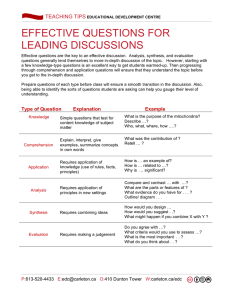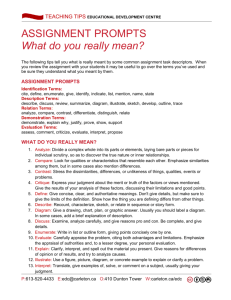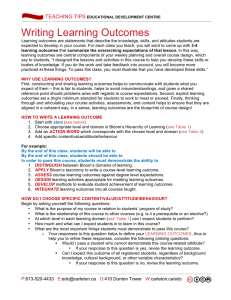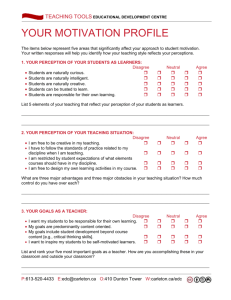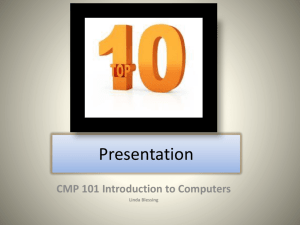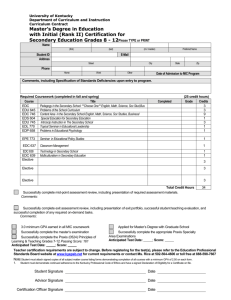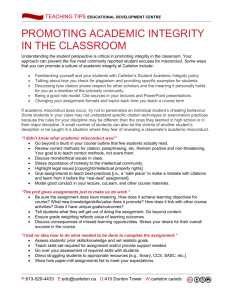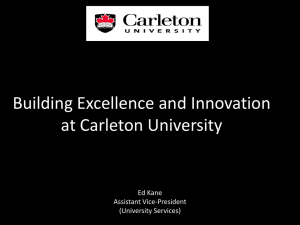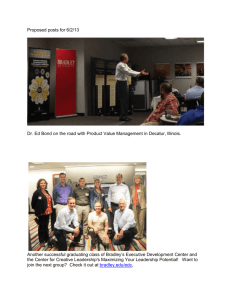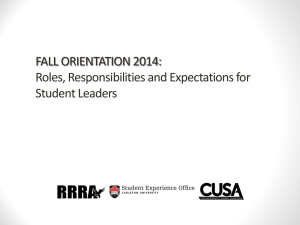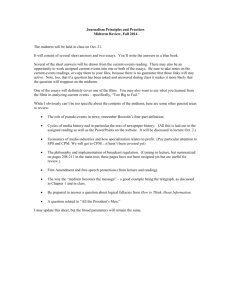docx - Carleton University
advertisement
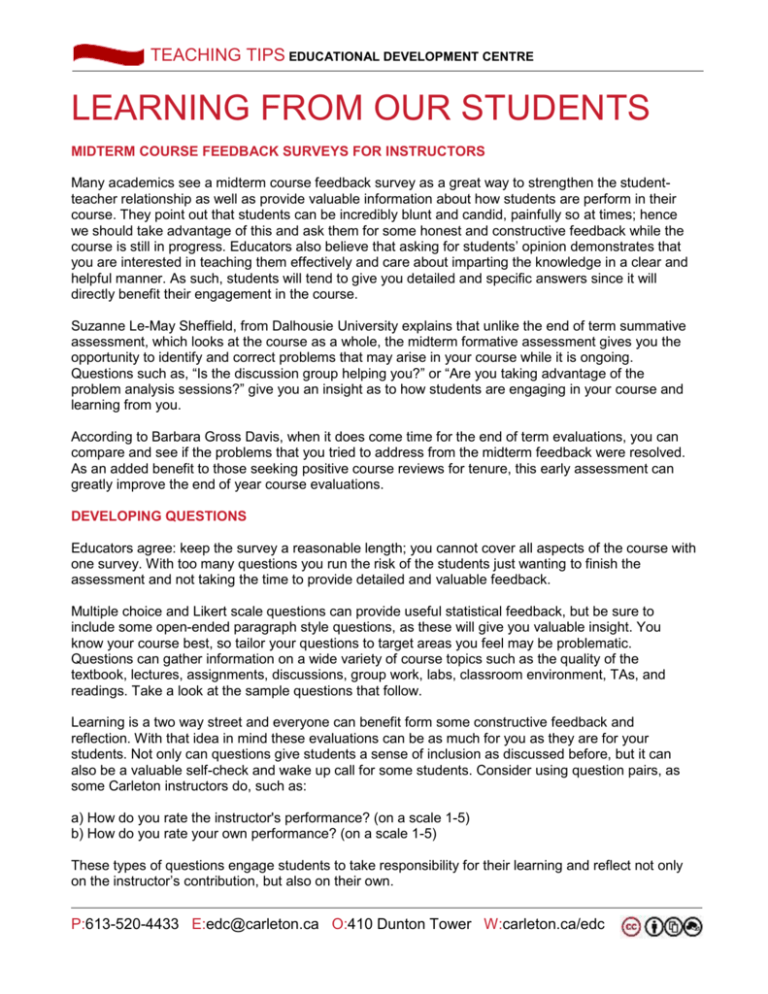
TEACHING TIPS EDUCATIONAL DEVELOPMENT CENTRE LEARNING FROM OUR STUDENTS MIDTERM COURSE FEEDBACK SURVEYS FOR INSTRUCTORS Many academics see a midterm course feedback survey as a great way to strengthen the studentteacher relationship as well as provide valuable information about how students are perform in their course. They point out that students can be incredibly blunt and candid, painfully so at times; hence we should take advantage of this and ask them for some honest and constructive feedback while the course is still in progress. Educators also believe that asking for students’ opinion demonstrates that you are interested in teaching them effectively and care about imparting the knowledge in a clear and helpful manner. As such, students will tend to give you detailed and specific answers since it will directly benefit their engagement in the course. Suzanne Le-May Sheffield, from Dalhousie University explains that unlike the end of term summative assessment, which looks at the course as a whole, the midterm formative assessment gives you the opportunity to identify and correct problems that may arise in your course while it is ongoing. Questions such as, “Is the discussion group helping you?” or “Are you taking advantage of the problem analysis sessions?” give you an insight as to how students are engaging in your course and learning from you. According to Barbara Gross Davis, when it does come time for the end of term evaluations, you can compare and see if the problems that you tried to address from the midterm feedback were resolved. As an added benefit to those seeking positive course reviews for tenure, this early assessment can greatly improve the end of year course evaluations. DEVELOPING QUESTIONS Educators agree: keep the survey a reasonable length; you cannot cover all aspects of the course with one survey. With too many questions you run the risk of the students just wanting to finish the assessment and not taking the time to provide detailed and valuable feedback. Multiple choice and Likert scale questions can provide useful statistical feedback, but be sure to include some open-ended paragraph style questions, as these will give you valuable insight. You know your course best, so tailor your questions to target areas you feel may be problematic. Questions can gather information on a wide variety of course topics such as the quality of the textbook, lectures, assignments, discussions, group work, labs, classroom environment, TAs, and readings. Take a look at the sample questions that follow. Learning is a two way street and everyone can benefit form some constructive feedback and reflection. With that idea in mind these evaluations can be as much for you as they are for your students. Not only can questions give students a sense of inclusion as discussed before, but it can also be a valuable self-check and wake up call for some students. Consider using question pairs, as some Carleton instructors do, such as: a) How do you rate the instructor's performance? (on a scale 1-5) b) How do you rate your own performance? (on a scale 1-5) These types of questions engage students to take responsibility for their learning and reflect not only on the instructor’s contribution, but also on their own. P:613-520-4433 E:edc@carleton.ca O:410 Dunton Tower W:carleton.ca/edc TEACHING TIPS EDUCATIONAL DEVELOPMENT CENTRE Some other useful questions from the University of Massachusetts: What do you like most about this course and/or the teaching of it? What do you like least about the course and/or the instructor's teaching of it? What suggestions can you offer that would make this course a better learning experience? And from Dalhousie University: How accessible/appropriate/related/useful is the textbook for this course? Did the problems worked out in class help you to understand how to work out questions on your own? Did you find the assignments relevant/interesting/challenging? Why or why not? Are the assignment/lab experiment procedures clearly explained? In what ways is the format of the class helpful or detrimental to your learning experience? IMPLEMENTATION Le-May Sheffield suggests that you should explain why you are giving this evaluation to your students and emphasize that it is an anonymous, voluntary process. Be sure to provide ample time to complete the survey. There are a number of ways to implement an anonymous survey. For paper-based surveys, conduct them at the beginning of class so that students are not swayed by a good or bad lecture and are not rushing to get out of class. Some instructors at Cornell University use the "white pages" of the student evaluation at midsemester to sample student responses. Some instructors write two or three questions on a blackboard and collect students’ responses at the end of the class. (Source: Teaching toolbox, Cornell University). Others invite a colleague or staff member to conduct a small group evaluation sessions with students. Each group of students writes down the groups’ comments. (Source: Clark and Redmond, 1982; Coffman, 1991). For online surveys, consider leaving them open for about a week so that students can contribute on their own schedule. Use the cuLearn feedback tool to create an online survey o Use questions from the EDC feedback question bank o Create a survey with your own questions Use other online survey tools such as Too Fast The EDC is available to help with any of these options. If you use a paper-based survey, our staff can come to your classroom anytime during the term to collect the feedback. ASSESSING THE RESULTS Studies show that you may experience anxiety when receiving student evaluation feedback. More experienced colleagues would advise you to focus on the positive and constructive ideas your students have said about the course and try not to take especially critical feedback personally. Ignore the polar comments - there will be people that strongly like or dislike you as an instructor. You are not a super hero and won’t be able to fix everything; focus on general trends and common themes. P:613-520-4433 E:edc@carleton.ca O:410 Dunton Tower W:carleton.ca/edc TEACHING TIPS EDUCATIONAL DEVELOPMENT CENTRE Faculty members who had done midterm evaluations before, warn that it is critical to take the survey process full circle and respond constructively to the results of the survey. Express your gratitude and share the results with your students in class shortly after the survey is completed. Let them know the actions you will take to help them or let them suggest ideas. Talk about the suggestions you will or will not act upon and explain why. Clarify any confusion about students’ expectations and your teaching goals for the course and assessments. Avoid being defensive or apologetic, but have faith in your teaching and course design. (Barbara Gross Davis, 1993). The EDC can help you with implementing, collecting, organizing and interpreting the information or with finding ideas for addressing any problematic area(s) that were brought up by the evaluation. Contact us to set up an appointment. SOURCES Clark, J., and Redmond, M., (1982), Small Group Instructional Diagnosis Final Report. Department of Biology Education, University of Washington. Coffman, S. J., (1991), Improving Your Teaching through Small-Group Diagnosis, College Teaching. Gross Davis, Barbara, (1993), Tools for Teaching, available at http://teaching.berkeley.edu/bgd/teaching.html Le-May Sheffield, S, (date unknown), Mid- Term Evaluations available at http://learningandteaching.dal.ca/midterm.html Yuankun, Y. and Grady, L. M., (2005), How Do Faculty Make Formative Use of Student Evaluation Feedback?: A Multiple Case Study, Journal of Personnel Evaluation in Education, Volume 18, Number 2 / May, 2005 http://www.umass.edu/cft/consultation.htm http://west.wwu.edu/blackboard/bb_tutorials/eval_survey.shtml http://west.wwu.edu/atus/blackboard/eval_survey.shtml http://www.crlt.umich.edu/gsis/gsimsf.html https://fusion.sas.upenn.edu/feedback http://depts.washington.edu/cidrweb/consulting/sgid.html http://www.ilr.cornell.edu/tac/toolbox/tips/feedback_mid.html http://cte.uwaterloo.ca/teaching_resources/teaching_tips/tips_challenges/using_midterm_feedb ack.pdf P:613-520-4433 E:edc@carleton.ca O:410 Dunton Tower W:carleton.ca/edc
